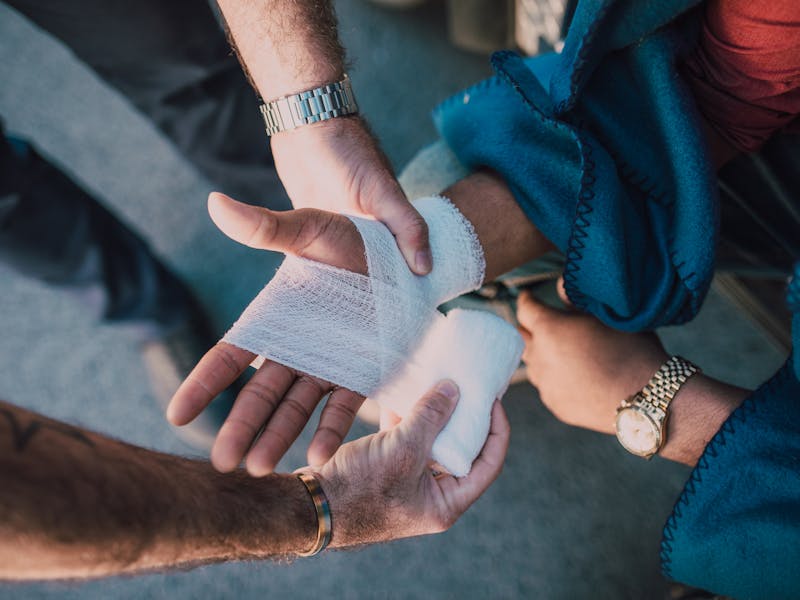What is a Personal Injury Claim (and Do I Have One)?

If you’ve been injured by someone else’s negligence, whether in a car accident, slip and fall incident, or any other situation, you may have heard someone say you might have a “claim”, “lawsuit” or “personal injury case” on your hands.
While there are many different terms for it, it all boils down to one thing: getting rightfully compensated for the injuries and damages you’ve suffered.
At Dodson Law Firm, PLLC, these are types of cases we handle everyday. We know that most people who’ve been in an accident or suffered an injury don’t know what these terms mean, where to start, or who to turn to. To help you understand your rights and options, we’ll explain what a personal injury claim is and how to tell if you have a case.
The Fundamentals of Personal Injury Law
Personal injury law, also known as tort law, is designed to protect you if you or your property is injured or harmed because of someone else’s act or failure to act. In a successful personal injury case, oftentimes, the defendant’s insurance company will compensate the plaintiff for their injuries and other damages. In some situations, when there is no insurance policy under which to recover, the assets of the defendant are used to satisfy a negotiated settlement or judgment.
In Texas, there are four key elements to a personal injury claim:
- Duty of care: The defendant owed you a legal duty of care.
- Breach of duty: The defendant breached that duty through their negligence or intentional act.
- Causation: The defendant’s breach of duty caused your injuries.
- Damages: You suffered actual damages as a result.
It’s important to note that in Texas, the statute of limitations for filing a personal injury lawsuit is generally two years from the date of the injury, with some exceptions. This means you have a limited time to take legal action, so it’s crucial to consult with an attorney as soon as possible.
Common Types of Personal Injury Cases
Personal injury cases can arise from a wide variety of accidents and incidents. At Dodson Law Firm, PLLC, we handle a range of personal injury cases, including:
Motor Vehicle Accidents
If you’ve been injured in a car accident, truck wreck, or motorcycle crash or as a pedestrian or bicyclist, you may have a personal injury claim against the at-fault driver.
Premises Liability
Property owners have a duty to keep their premises reasonably safe. If you’re injured in a slip and fall accident, by negligent security, or a dog bite, you may have a premises liability claim.
Medical Malpractice
If a healthcare provider’s negligence causes you harm, such as a surgical error, misdiagnosis, or birth injury, you may have a medical malpractice claim.
Product Liability
If you’re injured by a defective product, like a faulty vehicle part or dangerous drug, you may have a product liability claim against the manufacturer, designer, or distributor.
Workplace Accidents
If you’re hurt on the job, you may be entitled to workers’ compensation benefits – or if the employer is a non-subscriber to worker’s compensation – to alternative compensation. In some cases, you may also have a personal injury claim against a third party, like a negligent contractor or equipment manufacturer.
Wrongful Death
If someone’s negligence or intentional act causes the death of your loved one, you may be able to file a wrongful death claim to seek compensation for your losses.
Damages in Personal Injury Claims
Damages in personal injury cases are designed to compensate the plaintiff for their losses. There are three main types of damages:
Economic Damages
These are the quantifiable financial losses you’ve suffered, such as medical expenses, lost wages, and property damage.
Non-Economic Damages
These are the intangible losses you’ve suffered, like pain and suffering, emotional distress, and loss of enjoyment of life.
Punitive Damages
In rare cases where the defendant’s conduct was grossly negligent or intentional, the court may award punitive damages to punish the wrongdoer and deter future misconduct.
Proving Fault and Liability in a Personal Injury Case
To win a personal injury case, you must prove that the defendant was at fault for your injuries. This requires evidence of their negligence or intentional act.
In Texas, the rule of modified comparative negligence applies. This means that if you’re found to be partially at fault for your injuries, your damages will be reduced by your percentage of fault. If you’re more than 50% at fault, you won’t be able to recover any damages from the other party.
Personal Injury Claim vs. Lawsuit: What’s the Difference?
When seeking compensation for an injury, you may hear the terms “personal injury claim” and “personal injury lawsuit.” While often used interchangeably, they refer to different stages in the process.
A personal injury claim is a formal demand for compensation sent to the at-fault party or the at-fault party’s insurance company. The insurer will investigate and decide whether to accept, deny, or make a counteroffer.
If the at fault party or insurance company denies the claim or offers an unfair settlement, the next step may be filing a personal injury lawsuit. This is a formal legal action filed in civil court, where a judge or jury decides the case outcome. However, filing a lawsuit doesn’t always mean going to trial, as it can often lead to further negotiations and a settlement.
The Personal Injury Claim Process
If you’ve been injured due to someone else’s negligence, navigating the personal injury claim process can feel overwhelming. At Dodson Law Firm, PLLC, we understand the challenges you’re facing, and we’re here to guide you through every step of the process.
Here’s a general overview of the personal injury claim process:
- Seek medical treatment: Your health and well-being should always be the top priority. Seek medical attention immediately after your injury, and follow your doctor’s treatment plan.
- Consult with a personal injury attorney: Contact an experienced personal injury lawyer to discuss your case. At Dodson Law Firm, PLLC, we offer free, no-obligation consultations to help you understand your rights and options.
- Investigation and evidence gathering: Your attorney will investigate your case thoroughly, gathering evidence such as police reports, medical records, witness statements, and expert opinions.
- Send a demand letter: Once your attorney has a clear picture of your damages, they’ll send a demand letter to the at fault party or the at-fault party’s insurance company. The demand letter outlines your injuries, damages, and the compensation you’re seeking.
- Negotiations: Your attorney will negotiate to try to reach a fair settlement that adequately compensates you for your injuries and losses.
- Filing a lawsuit: If the at fault party or the insurance company denies liability or fails to offer a fair settlement, your attorney may recommend filing a personal injury lawsuit. This formal legal action moves your case into the court system, where a judge or jury will ultimately decide the outcome.
- Discovery and pre-trial preparations: During the litigation process, both sides will engage in discovery, exchanging information and evidence. Your attorney will handle all aspects of the pre-trial process, including depositions, motions, and expert witness preparation.
- Mediation or settlement: Many personal injury cases are resolved through mediation or settlement negotiations before going to trial. Your attorney will continue to fight for your best interests and work towards securing a favorable settlement on your behalf.
- Trial: If a settlement cannot be reached, your case will go to trial. At Dodson Law Firm, PLLC, our experienced trial attorneys will present your case in a clear, compelling manner, advocating for your rights and the compensation you deserve.
Throughout the entire process, your personal injury lawyer at Dodson Law Firm, PLLC, will be your dedicated advocate, working tirelessly to protect your rights and achieve the best possible outcome for your case.
We understand that this is a challenging time in your life, and we’re here to provide the compassionate, client-focused representation you need every step of the way.
FAQs About Personal Injury Claims
How long do I have to file a personal injury lawsuit?
In Texas, you generally have two years from the date of your injury to file a personal injury lawsuit. There are some exceptions, so it’s important to consult with an attorney as soon as possible.
What if I’m partially at fault for my injuries?
Under Texas’s modified comparative negligence rule, you can still recover damages as long as you’re less than 51% at fault. However, your damages will be reduced by your percentage of fault.
How much compensation can I get for my personal injury case?
The amount of compensation you can recover depends on the specific facts of your case, including the severity of your injuries, your economic losses, and the available insurance coverage. An experienced personal injury attorney can help you determine the value of your claim.
Do I need a personal injury lawyer?
While you’re not legally required to hire a lawyer, having an experienced personal injury attorney on your side can make a significant difference in the outcome of your case. They can help you navigate the legal process, gather evidence, negotiate with insurance companies, and fight for the maximum compensation you deserve.
Think You Have a Personal Injury Claim? Contact Dodson Law Firm, PLLC
If you or a loved one has been injured due to someone else’s negligence, the dedicated team at Dodson Law Firm, PLLC, is here to help. With years of experience handling personal injury cases across Texas, we have the knowledge and resources to guide you through this challenging time and fight for the justice you deserve.
Don’t wait to get the help you need. Contact Dodson Law Firm, PLLC, today for a free, no-obligation consultation with one of our compassionate personal injury attorneys. We’re here to listen to you, answer your questions, and provide the experienced legal representation you need to move forward with your life.
 Wendi Dodson is an experienced attorney and the founding partner of Dodson Law Firm, PLLC, a family law and personal injury firm in Houston, TX. Her practice areas include divorce, child custody, child support, spousal support, property division, and personal injury cases. As a Texas Certified Mediator and graduate of Harvard Law School’s Program on Negotiation, Wendi brings exceptional conflict resolution skills to her practice.
Wendi Dodson is an experienced attorney and the founding partner of Dodson Law Firm, PLLC, a family law and personal injury firm in Houston, TX. Her practice areas include divorce, child custody, child support, spousal support, property division, and personal injury cases. As a Texas Certified Mediator and graduate of Harvard Law School’s Program on Negotiation, Wendi brings exceptional conflict resolution skills to her practice.



